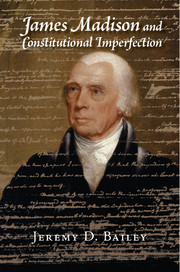Book contents
- Frontmatter
- Dedication
- Contents
- Preface
- Acknowledgments
- Abbreviations
- 1 The Madison Problem
- 2 Appeals to Tradition: The Case for and against Veneration
- 3 Appeals to Elites: The Problem with Deliberation
- 4 Public Opinion before Parties
- 5 The Turn to Public Opinion
- 6 Appeals to the People: Madison and the Revolution of 1800
- 7 Appeals to Text and History
- 8 “Take care of me when dead”
- Index
6 - Appeals to the People: Madison and the Revolution of 1800
Published online by Cambridge University Press: 05 November 2015
- Frontmatter
- Dedication
- Contents
- Preface
- Acknowledgments
- Abbreviations
- 1 The Madison Problem
- 2 Appeals to Tradition: The Case for and against Veneration
- 3 Appeals to Elites: The Problem with Deliberation
- 4 Public Opinion before Parties
- 5 The Turn to Public Opinion
- 6 Appeals to the People: Madison and the Revolution of 1800
- 7 Appeals to Text and History
- 8 “Take care of me when dead”
- Index
Summary
“[T]he revolution of 1800 … was as real a revolution in the principles of our government as that of 1776 was in its form; not effected by the sword as that, but by the rational and peaceable instrument of reform, the suffrage of the people.”
Thomas JeffersonEven though there has been a resurgence of attention to James Madison, scholars have had surprisingly little to say about Madison during the period between 1800 and 1824. As discussed in the introduction, attention to Madison so far has mostly concentrated on Madison's efforts in the late 1780s and early 1790s to form, ratify, and implement the Constitution of 1787. Very little has been written about Madison's participation with Jefferson after 1800 to execute the Republican agenda they articulated in the 1790s.
To the extent that scholars have examined Madison in this period, the emphasis has been limited to several well-known events. The first is Madison's seeming switch on the question of the national bank. Here, scholars have noted that Madison eventually came to see the need for the national bank, perhaps because of the practical necessities revealed during the war, and came to accept its constitutionality. Accordingly, some scholars have pointed to Madison's statement that the bank's constitutionality was “settled” over time and have thus argued that what appears to be a contradiction is actually a consistency of a particularly Madisonian variety. The second is the War of 1812. Presidency scholars have long pointed to this episode to conclude that Madison as Commander in Chief was less impressive than Madison as constitutional designer (1780s) or constitutional interpreter (1790s). Although scholars have increasingly become more attentive to Madison's refusal to curtail civil liberties during wartime, Madison's prosecution of the War of 1812 has not received high marks among presidency scholars and has been all but ignored by students of Madison's political thought (though, for some, it demonstrates the impracticality of Madison's understanding of executive power). The third is the Missouri Compromise. Here, scholars have noted that Madison sided with Virginia and the South rather than with the antislavery argument.
- Type
- Chapter
- Information
- James Madison and Constitutional Imperfection , pp. 114 - 140Publisher: Cambridge University PressPrint publication year: 2015



